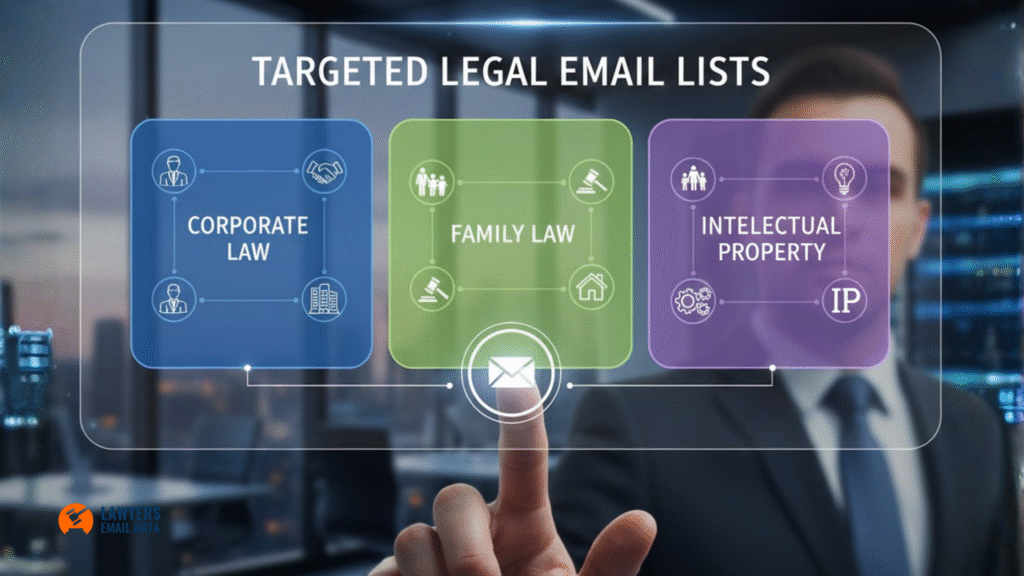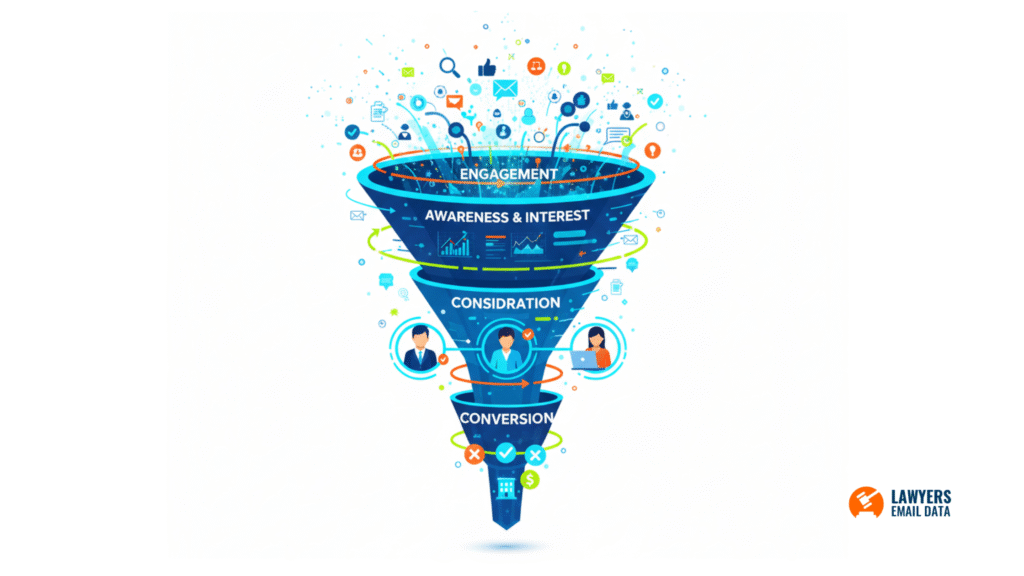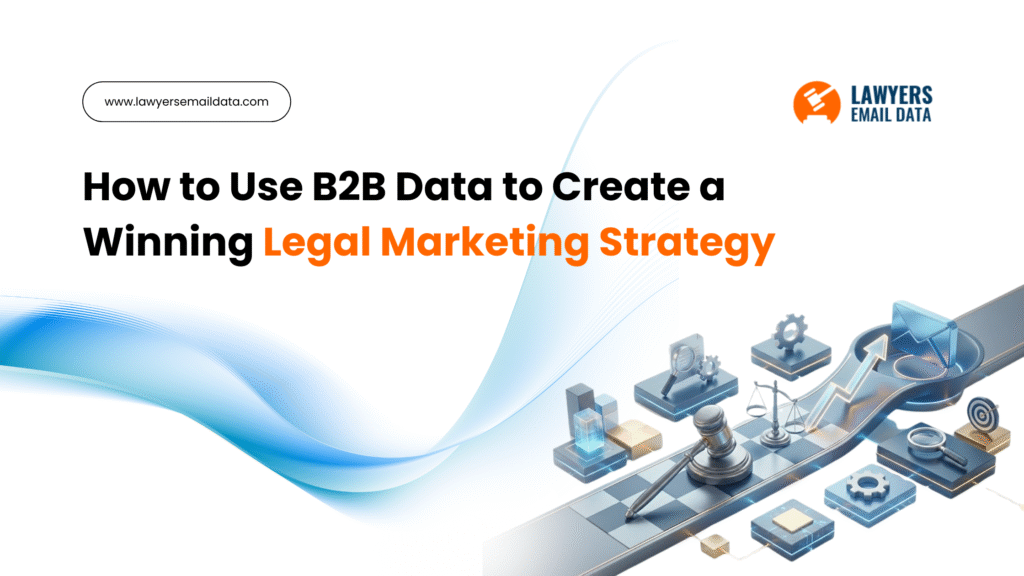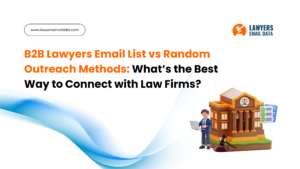In an era of information overload and increasing competition, law firms need more than just traditional marketing methods to stand out. Whether you’re a small boutique firm or a large, multi-office practice, the right legal marketing strategy can make all the difference in driving client acquisition and boosting your firm’s ROI.
One powerful way to supercharge your marketing efforts is by using B2B data, a tool that not only allows you to better understand your audience but also helps you deliver more personalized, relevant content. While B2B data is useful for many industries, it’s especially critical for law firms that need to reach very specific, often hard-to-target, decision-makers.
But how do you leverage this data effectively, particularly in the realm of email marketing? And why is email list segmentation so crucial to ensuring your messages reach the right audience?
In this guide, we’ll break down the role of B2B data in legal marketing, highlight the importance of email list segmentation, and explain how using verified and targeted email lists can lead to higher engagement and better results for your campaigns. Plus, we’ll give you practical tips on how to build and maintain a high-quality legal email list to ensure your outreach efforts never fall flat.
Why B2B Data Matters in Legal Marketing
At its core, B2B data is any data that provides insights into other businesses, including details about key decision-makers, firm size, revenue, industry, and other demographic or behavioral characteristics. But why should law firms care about B2B data in the first place?
For law firms, using B2B data allows you to go beyond simply sending mass emails or hoping your content finds its way to potential clients. Instead, it empowers you to target specific individuals-whether that’s a CEO of a tech company or a General Counsel at a large corporation-who are most likely to need your services.
Here are some compelling reasons why B2B data is crucial for legal marketing:
a) Helps You Reach Decision-Makers
With B2B data, law firms can identify the key decision-makers within businesses and target them directly. In the legal industry, decision-makers are often the hardest people to reach through traditional marketing methods. By knowing who they are and what they need, law firms can craft tailored marketing messages that appeal directly to their challenges and interests.
b) Increases Targeting Precision
Without quality data, marketing efforts can be inefficient. For example, a firm that offers corporate legal services may be wasting time sending generic emails to individuals or companies that don’t need those services. Instead, with the right data, firms can target the companies, industries, and job roles that would benefit from their offerings.
c) Builds Trust and Credibility
When marketing content speaks directly to the unique needs of a business or individual, it creates an impression of personalization and expertise. This is particularly important in the legal industry, where trust and credibility are paramount. The more personalized and relevant your outreach is, the more likely potential clients will be to trust your firm.
The Power of Email List Segmentation for Law Firms

One of the most powerful tools in a law firm’s marketing strategy is email list segmentation. This involves dividing your email list into smaller groups (or segments) based on specific criteria, which allows you to send highly relevant and personalized content to each group.
Why is this important? When you segment your email list, you ensure that your messages aren’t just broadcasted to a large, general audience. Instead, each email goes to the person who is most likely to benefit from it, increasing the chances of engagement and conversion.
Here are a few examples of how you can segment your email lists for maximum impact:
a) Segment by Practice Area
Law firms typically specialize in multiple practice areas, such as corporate law, criminal law, intellectual property, or family law. By segmenting your email list according to these practice areas, you can tailor your messages to address the specific needs of each group. For example, a corporate law email may discuss mergers and acquisitions, while a family law email might focus on divorce or custody issues.
b) Segment by Firm Size
The size of the law firm is another critical factor in segmentation. A large, multinational law firm may have different legal needs compared to a small solo practitioner. By segmenting based on firm size, you can tailor your message to match the unique challenges and opportunities that each firm faces. For example, a small firm may be more interested in cost-effective legal solutions, while larger firms may prioritize high-level legal strategy.
c) Segment by Geographic Location
Location-based segmentation is especially important for law firms that specialize in regional or national law. For instance, a firm based in New York may want to target businesses or individuals in the tri-state area who need advice on New York state-specific laws. Conversely, national or international firms might use location-based segmentation to focus on clients in multiple regions, ensuring they comply with specific legal requirements in each jurisdiction.
d) Segment by Engagement Level
One often-overlooked method of segmentation is engagement level. Subscribers to your email list may vary in how much they’ve interacted with your previous communications. By segmenting your list based on engagement (such as open rates, clicks, or form submissions), you can send more targeted content to each group. Highly engaged recipients might be ready for an offer or consultation, while less engaged subscribers may require more educational content or a gentle nudge to re-engage.
By segmenting your email list in these ways, you can create personalized marketing messages that are much more likely to resonate with your audience.
Why Verified Email Lists Are Crucial for Law Firms

You’ve got your segmentation strategies in place-now it’s time to ensure your email list is verified. Verified email lists are essential to making sure that your campaigns reach the right people and provide real value.
a) Improve Deliverability
Sending emails to outdated, incorrect, or invalid addresses results in bounced emails, which lowers your deliverability rate and damages your sender reputation. By using a verified email list, you ensure that your messages reach the right inbox, rather than getting lost in the spam folder.
b) Avoid Wasted Marketing Spend
Every email campaign you run costs time and money. Sending emails to people who aren’t interested or don’t even exist wastes resources. Verified lists minimize this risk, allowing you to focus your efforts on high-quality leads that are most likely to convert into clients.
c) Better Engagement
A clean, verified email list leads to better open rates and click-through rates. When you’re sending emails to the right people, with content that’s relevant to them, they’re far more likely to engage with your message. This directly improves your ROI, making each email campaign more effective.
How to Build and Maintain a High-Quality Legal Email List
Building and maintaining a high-quality email list doesn’t happen overnight. But with the right strategy, you can develop a list that will continue to serve your marketing efforts for years to come.
a) Invest in Data Providers
Creating and maintaining an effective email list can be time-consuming and challenging, especially if you’re trying to track down the right decision-makers. That’s where trusted data providers like Lawyers Email Data come in. These providers offer pre-verified, high-quality, and highly segmented email lists that cater specifically to the legal industry.
By working with a reputable data provider, you gain access to a vast database of contacts, segmented by factors such as practice area, geographic location, and firm size. This ensures that your emails reach the right audience, without wasting time on irrelevant contacts.
b) Offer Valuable Resources to Attract Subscribers
Building an email list starts with offering value. Lead magnets such as free eBooks, legal guides, whitepapers, or webinars can help you attract new subscribers. Once someone has opted into your list, you can continue to nurture them by providing relevant and valuable content tailored to their legal needs.
c) Regular List Maintenance
Even the best email lists can become outdated over time. People change jobs, companies relocate, and email addresses can become inactive. To keep your list in top shape, you need to regularly clean it by removing outdated or incorrect email addresses. Additionally, track the engagement levels of your subscribers and prune those who haven’t interacted with your emails in months.
Legal Marketing Strategies with Data-Driven Insights
B2B data isn’t just useful for email campaigns-it can inform every aspect of your legal marketing strategy. For example, using data to refine your target audience or to run highly targeted ads can dramatically improve your marketing efforts.
a) Targeted Ads
Beyond email marketing, B2B data allows you to run highly targeted ads on platforms like Google Ads, LinkedIn, or Facebook. By targeting businesses or individuals who fit your ideal client profile, you can ensure that your ads are shown only to those who are most likely to convert.
b) Client Personas
With the right data, you can refine your client personas. Data-driven insights provide you with a more detailed understanding of your target audience’s demographics, pain points, and behaviors, which allows you to create more personalized and effective marketing campaigns.
c) Lead Nurturing
Once a prospect is on your list, it’s essential to nurture them through a strategic funnel. Using data-driven insights, you can track which stage of the buyer’s
journey they’re in and send them tailored content that guides them to the next step-whether that’s booking a consultation or signing a retainer agreement.

Conclusion: Maximize Your Legal Marketing Strategy with B2B Data
In a crowded legal market, standing out requires a data-driven approach that targets the right people with the right message. By using B2B data to build segmented, verified email lists, you can create personalized, effective marketing campaigns that deliver results. Whether you’re looking to increase engagement, drive conversions, or enhance client relationships, data-driven strategies are the key to long-term success.
Ready to build your targeted legal email list and take your marketing strategy to the next level? Contact us today for a personalized consultation on how to leverage verified, high-quality B2B data to optimize your legal marketing campaigns.
FAQs
B2B data allows law firms to target the right decision-makers, improve targeting precision, and increase engagement by delivering personalized, relevant content. It’s the backbone of any successful legal marketing campaign.
Email list segmentation divides your email list into smaller groups based on specific criteria, such as practice area, geographic location, or firm size. This ensures that your messages are tailored to the needs of each recipient, leading to better engagement and conversions.
Partnering with a reputable data provider like Lawyers Email Data can provide you with segmented, verified email lists tailored to the legal industry. These lists are updated regularly to ensure that your outreach reaches the right people.
To maintain a high-quality email list, you should regularly clean it by removing inactive or outdated contacts, track engagement levels, and ensure that your subscribers are still interested in receiving your content.
To comply with email marketing regulations such as GDPR and CAN-SPAM, ensure that you have proper consent from your subscribers, provide clear opt-in and opt-out options, and respect the privacy of your audience.



